The role of protein in building muscle and in the body in general cannot be overstated. Compared to fat and carbohydrates, protein requires the most digestion and absorption (making us feel full).
Today, protein powder is commonly added to the diet, and many people believe it’s necessary to stay healthy. Protein powder is generally thought to indicate healthy eating, but this is not always true.
For most people, protein powder is not needed. We already have several sources of protein at our disposal! These factors make it essential for you to understand that protein powders are convenient ways to supplement your meals or snacks with extra protein and that understanding how to choose one will aid in your decision.
You can buy protein powder in different forms, and each has its advantages and disadvantages. The enormous variety of protein powders on the market can make choosing one difficult.
It doesn’t matter your goals, physiology, or preferences, and each person has a unique set of circumstances. Therefore, there is no perfect protein powder for everyone
It is possible to characterize or categorize protein supplements in several ways. To date, they fall into two categories: animal-derived and plant-derived
Source of Protein Powders
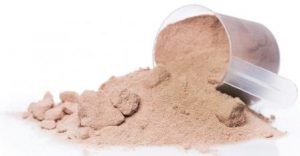
Animal-Based Protein Powder:
Animal-based proteins such as whey and casein (derived from dairy) and collagen (often bovine or marine) are also popular. The cheese-making process yields casein and whey as bi-products. Once they have been dried and powdered, they are used as food additives.
Protein Powder Made from Plants:
The plant-based protein powders include rice, hemp, soy, and pea protein powders. Protein powders containing plant-based sources have a range of references (the building blocks of proteins are amino acids). Various sources are used to provide a diverse amino acid profile.
Now that we know where protein powder comes from let’s talk about how to choose it.
What to Look For in a Protein Powder
Protein Types
Choosing a protein powder is all about knowing what is right for your body and the most suitable. The type of protein you should consume will depend on your fitness regimen.
In addition to their high amino acid content, many isolates and concentrates are suitable for post-workout consumption. Most protein powders contain soy or whey proteins. Whey, which is separated from milk during the separation process, is considered whole protein.
Soybean protein, on the other hand, is made from defatted soybean flakes. In turn, this reduces harmful cholesterol levels and makes bones denser. As well as these options, there are vegan protein powders made from casein, hemp, peas, and pea protein.
These are some of the prominent protein supplements offered in India:
- Collagen Peptides (Hydrolysed) Powder Protein Supplement, 250 gm, Price – ₹ 999
- Prozime Vegan Pea Protein, Plain, Price – ₹ 2700
- Prozime Whey Protein Concentrate, Strawberry, Price – ₹ 2700
Goals for your fitness

As we mentioned previously, it would be best to consider the fitness goals when selecting a protein powder. Should you be looking to build muscle mass, you should look at whey isolates or powders. Popular whey protein powder won’t work when you try a vegan diet or need to replace a meal. You should customize protein supplements based on your individual needs.
The Biological Value
We can measure a protein’s biological value to determine how much is absorbed or utilized by the body. With a higher BV, proteins are more easily absorbed by the body.
In addition to your fitness goal, it would be wise to consider your purpose for taking the protein supplement. A protein’s BV may differ depending on the type, so it will not be indicated on the packaging. In terms of value, whey protein is among the most effective protein supplements for muscle growth.
BCAA content
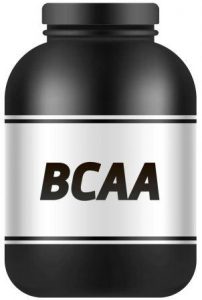
BCAAs contain branched-chain amino acids. There is no doubt that BCAAs increase protein synthesis in the body. A BCAA is a unique amino acid that enhances protein synthesis, and amino acids make up proteins. These proteins contain fewer calories, so if you’re trying to lose weight and keep a certain amount of muscle, these are better than whey proteins.
Many protein supplements contain BCAAs, which are usually mentioned on the packaging. The BCAAs are not “necessary,” but depending on the type of exercise you want to do, you can look for a powder with more or less of them.
Here are a few BCAA-rich supplements:
- G6 BCAA with Mango Flavour (30 Servings, 300 gm), Price – ₹ 2300
- Test Plus Testo Booster (60 Tablets), Price – ₹ 2200
- Prozime Whey Protein Concentrate, Plain, Price – ₹ 2700
How Much It Costs
The price point will most certainly determine the decision. When working out how much protein you will ingest per gram, it is best to look at how much protein is present in the powder.
We saw how much the cost would increase if we combined everything we discussed, whey protein isolates with high bioavailability, with BCAAs added. Protein provides the nutrients your body requires in the form it requires.
What are the benefits of protein powder?
The best source of protein may not always be whole foods. Protein powder has several benefits that may be worth considering.
Convenience is obvious
The issue is that many people do not have the time (or desire) to eat a nutritious supper. It may occur if a person is forced to work or care for others despite being highly busy. It has a high protein demand, but neither the willingness nor the time to ingest high-protein whole foods.
Finding the best plant-based protein sources and changing your diet.It might be tough to meet your protein requirements while you’re traveling or have restricted dietary options.
Appetite:
Sometimes people aren’t hungry enough to eat the required protein. It can happen if a person is:
- Trying to gain weight but finding it difficult to eat more
- Despite being ill, they have not eaten in a long time.
- Eating insufficiently to meet the nutrient needs for better athletic performance.
All of these points are well-founded. On the other hand, protein powder isn’t necessary for optimum health. It’s a dietary supplement, not a nutrient-dense meal.
Protein powder: can you have too much?
If you’re going to use protein powder, a daily dose of 20-40 grams (usually 1-2 scoops) is a decent place to start. It is recommended that most individuals consume no more than 80 grams of supplemental protein each day (about 3-4 scoops). It is simply a suggestion, not a hard and fast rule.
The main reason for this is that most people shouldn’t take more than 80 g of protein powder per day because it substitutes entire dietary sources of vitamins, minerals, and other nutrients. Individuals attempting to gain weight are, of course, an exception.
What makes protein concentrate, isolate, and hydrolysate different?
Powdered proteins may be in the form of concentrates, isolates, or hydrolysates, made in various ways.
Concentrates:
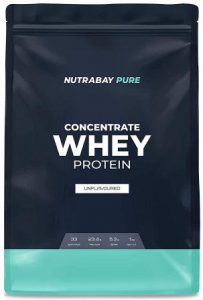
High heat, acids, or enzymes can sometimes be used to extract protein from animals or plants. Compared to other types of protein, concentrates contain up to 80 percent protein by weight.A typical plant protein contains 70 to 80 percent protein (although it can contain less protein than animal proteins).
Carbohydrates and fats account for what’s left over. If you don’t mind getting a few more calories from non-protein sources, protein concentrate might be a decent substitute for you.
Isolates:
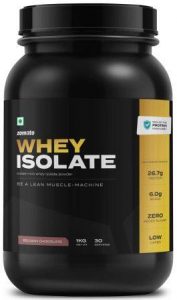
A supplementary filtering process keeps protein isolates intact by removing 90% or more of the surplus protein by weight while degrading fat and carbohydrates. These isolates somewhat help their digestion, but it has little effect on their regeneration rate, muscle growth, or fat suppression.
Isolates may be a preferable alternative for those who are managing their fat or carb intake or who are prepared to spend extra for the chance of an additional benefit, even if it isn’t proved, because isolates frequently contain less fat and carbohydrates than concentrates.
In addition to whey, casein, and milk protein isolates, people with lactose intolerance may also benefit from these products since they are more thoroughly processed.
Protein hydrolysates:
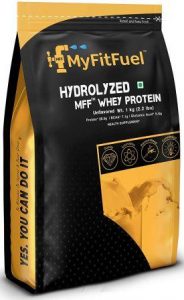
Enzymes and acids can further process proteins by heating and enzymatically reducing the peptide chain length.
These additional steps would improve the digestibility and absorbability of hydrolysates of proteins. It is most likely because they’re meant for people trying to gain muscle and drink protein before working out. This process makes sense in theory, but evidence indicates that hydrolysates are less efficient than isolates.
In some cases, though, hydrolysates can be more digestible since they contain less lactose and are pre-digested due to their processing. Hydrolysates have several disadvantages in addition to their benefits. Their bitter taste must be counteracted by a significant amount of sugar.
Further, whey protein isolates and concentrates that are not ionized retain micro fractions that have digestibility and mood-enhancing properties. Unlike whey hydrolysates (and ionized isolates), this micro fraction is not found in whey hydrolysates. (Casein also appears to possess some bioactive micro fractions. However, its studies are limited).
If you have a limited budget, hydrolysates can become costly as well. Increasing the processing level of protein powder increases its price.
Do protein powders cause digestive problems?
Protein powders containing those ingredients should be avoided by people with food intolerances or sensitivities. You are likely to benefit more from plant-based protein powder if, for instance, you have a dairy or egg allergy.
More processed options, like isolates and hydrolysates, are easier to digest if you suffer from digestive issues. It’s not uncommon to experience digestive upset after consuming a new protein powder. Multiple factors can cause it. You can solve the problem by using the following checklist.
Ingredients:
There could be allergies to elements in the powder, or you might not like the preparation process. Hence, it is vital to check the ingredient label (more about this below). Trying a few different protein powders may be necessary before you find the right one for you.
Overall diet:
Your body’s response to protein powder is also affected by the food you consume on the day. People who have trouble handling lactose after they get over their threshold will often get sick from it. Using protein powder containing lactose could push you over the edge.
Amount:
There is often a connection between quantity and quality. Men are sometimes instructed to add two scoops of protein powder to their shake. The digestive tract may have difficulty handling this much weight at once for some people. Other shakes contain 1500 calories for weight gain. Many people would have a difficult time digesting that. Hence, starting with a small amount may be beneficial.
Speed:
Over consuming liquids too quickly can lead to an upset stomach. A shake containing many ingredients will take some time for your digestive system to comprehend.
Protein Powder Alternatives:
Simply because you’re active, protein powder isn’t essential for your health. The protein we get from our whole food sources is usually enough to meet our needs most of the time. This food is suitable for vegetarians as well as vegans!
It is also difficult to find protein powder, which makes it extremely expensive. You should consume naturally high-protein food first to get your protein. Hopefully, this post has helped you navigate all the protein powder options available to you.
Protein powder isn’t necessary to stay healthy. It’s a supplement, not an essential nutrient.


